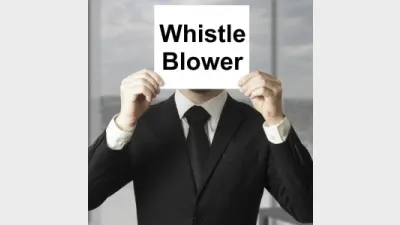Whistleblowing – ‘too easy to criticise’



Assumptions that whistleblowers are generally mistreated and ignored should not be taken for granted, as many companies look to staff members to identify wrongdoing and cultural issues, an academic says.
Launching the Australian Research Council's Whistling While They Work 2: Improving managerial responses to whistleblowing in public and private sector organisations, project leader, Professor AJ Brown, said there was strong support for legislation and standards on whistleblowing but little guidance on what form they should take.
"It is too easy to criticise corporate leaders, attack regulators and paint a picture of whistleblowers as overwhelmingly ignored and mistreated, when we know that in both government and business, there are positive efforts and lessons, not just negative ones," Brown said.
"Given the extent of consensus on the need for new legal and governance standards, it's time to turn our attention to what those standards need to contain, to best support internal, regulatory and public whistleblowing — rather than defeat ourselves by assuming that organisations and regulators can never get it right, or that whistleblowers are destined to suffer, no matter what."
Governance Institute of Australia chief executive, Steven Burrell, backed Brown's assessment that most Australian businesses have been genuine in their desire to prevent misconduct from within their ranks.
"After all, a company's public standing depends on a reputation for ethical behaviour and this must be backed by a commitment to a fair and effective whistleblowing process, where wrongdoing is rigorously investigated and action taken to stamp it out," Burrell said.
"Regulators and policy-makers have quite rightly homed in on the important link between a good corporate culture and ethical corporate conduct.
"And a robust and independent whistleblowing process that makes employees feel comfortable about fearlessly reporting wrongdoing is a critical asset in building the kind of positive, ethical culture that supports strong corporate outcomes.
"However, the challenge for many organisations is that there is currently little evidence-based information to guide them in developing best practice whistleblowing processes that actually work and which have the confidence of staff, management and the board alike,"
Recommended for you
The Reserve Bank of Australia (RBA) has lowered rates to a level not seen since mid-2023.
Financial Services Minister Stephen Jones has shared further details on the second tranche of the Delivering Better Financial Outcomes reforms including modernising best interests duty and reforming Statements of Advice.
The Federal Court has found a company director guilty of operating unregistered managed investment schemes and carrying on a financial services business without holding an AFSL.
The Governance Institute has said ASIC’s governance arrangements are no longer “fit for purpose” in a time when financial markets are quickly innovating and cyber crime becomes a threat.












